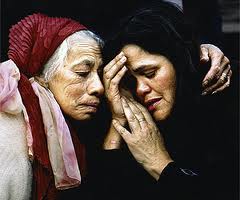No Honour in Gender Violence
No Honour in Gender Violence
For anyone following the news from Pakistan, the past few weeks have made for grim reading when it comes to violence against women. Recently, a 21-year old woman in Punjab was found raped and strangled to death by the man she had trusted to save her from an “honour” killing by her family.”
In early June, Saba Maqsood miraculously survived being shot by her relatives and dumped into a canal in Hafizabad town in Pakistan’s Punjab province for trying to marry the man of her choosing against family wishes.
A week earlier in Lahore, Farzana Iqbal was brutally beaten to death with bricks by up to two dozen relatives including her father for marrying the man she loved. Sadly, hundreds of women and girls are subject to “honour” killings in Pakistan every year. For many communities in Pakistan, women and girls are seen to embody family honour. A woman’s identity and her family’s sense of social respect and worth is measured by her acquiescence to family demands, such as marrying the man they choose for her.
What made Iqbal’s death unique was the fact that the perpetrators chose to kill her so brazenly, outside one of the most respected state institutions: the Lahore High Court, in the second largest city in Pakistan and arguably its cultural capital. By all accounts, instead of protecting Iqbal and saving her life, the police stood by and watched the crime unfold. Most cases like this, however, receive scant attention by the public and the police, as they often happen in small villages or behind closed doors.
In February, for example, Ayat Bibi was bludgeoned to death in a north Balochistan village on the orders of a local cleric after being accused by a male relative of having relations with a man named Daraz Khan, who was also killed. Ayat and Daraz’s final resting places are both unmarked graves. Those responsible for the killings have not been brought to justice.
Farzana Iqbal’s killing, and the publicity that followed, shamed Pakistan’s prime minister and the Chief Justice of the Supreme Court into demanding investigations into the incident. Most of the key culprits were soon in jail, and the murder trial is expected to begin shortly. Some politicians and religious leaders have condemned the killing, a welcome move in a country where all too often violence against women is ignored or even justified based on religious or cultural values.
But what would have been the response if this crime had not been perpetrated in such a public and symbolic space and drawn global attention? As the spotlight fades away from this case, and Iqbal’s battered body settles in the ground like hundreds of others, are the authorities likely to lose interest in ensuring her killers are brought to justice and that the police are held to account for their failure to protect her?
Seeking justice is extremely problematic in Pakistan, as a wide legal loophole currently exists that allows perpetrators of “honour” killings to escape any punishment. Under Pakistani law in cases of murder, the victim’s family is allowed to pardon the perpetrators; the culprits are then free from prosecution and sentencing.
So-called honour killings are ubiquitous in several parts of South Asia and other corners of the world. It is difficult to determine exactly how many women fall victim to killings justified as the defense of family “honour,” but the number runs into the thousands worldwide.
Often the most severe punishments for transgressions of “honour” or for bringing “shame” on a family are decreed by councils of tribal elders – in which women have no place. In Pakistan the statistics vary from around 900 to just over 1,000 each year. But these figures represent only instances documented by human rights groups based on reports from the media or law enforcement authorities.
Addressing these issues, whether in Pakistan, or anywhere else in the world, is challenging because the causes are complex. But like so many other social problems, positive change must start at home. Too often the home is where the use of violence becomes normalized. It is where the citizen gets conditioned to believe that violence is an acceptable, particularly to excuse violence that is carried out to protect perceived social standing, national honour, or religious sentiments.
Honour crimes fester in the dark privacy of the home. It is time to expose these abuses to the light of public scrutiny and the law. A number of states have outlawed honour killings and other forms of gender-based violence. But those laws require effective implementation, police and other law enforcement professionals must be trained on gender-based violence. And victims must be confident in the ability of the police and other authorities to assist them.
The education system is also a key battleground, because it is one of the rare public spaces where young minds can be empowered to challenge gender stereotypes and made aware that violence in the home is unacceptable. Public figures, and especially men, must openly speak out: not only to condemn honour-killings but to acknowledge that these abuses are not random or sporadic incidents but a much wider problem. Empirical research in this area is limited, but there is ample anecdotal evidence that public exposure is the most effective way to address the issue, because it forces society to confront the reality that there is no honour in killing women and girls for choosing to live life on their own terms.

Comments